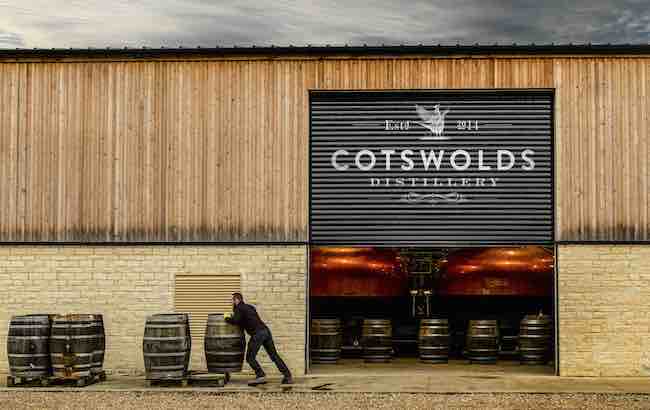English whisky GI nears finalisation
Maturing casks of English whisky are now worth an estimated £1 billion (US$1.33bn), with the category’s GI in the final stages.

According to the English Whisky Guild’s (EWG) Annual Review 2025, the total production capacity of England’s whisky distilleries has risen from 2.1 million litres per year to around 5m litres.
In addition, maturing casks across England are now worth an estimated £1bn, based on current stock and average bottle price.
There are now more than 60 distilleries laying down whisky and 38 selling English whisky, the report noted.
The EWG was launched in 2022 with the aim of showcasing and protecting whisky made in England.
The EWG noted that visitor numbers to English whisky distilleries soared from 250,000 to 337,747 in just 12 months.
It also revealed that in 2024, 40% of distilleries exported their whiskies, of which 89% were sold in EU markets.
English whisky is also being consumed in approximately 35 markets across the world.
Around 50,000 cases of English whisky are sold annually, with more than 100 new product releases in 2024.
More than 90% of distilleries produced malt whisky in 2024, but there is also interest in other grains, with seven rye whiskies on the market, the EWG said.
Furthermore, the English whisky sector employs 317 full-time workers.
English whisky GI update
The guild is also behind the proposed geographical indication (GI) for the category, working alongside the UK Department for Environment, Food and Rural Affairs (Defra) on the GI application.
The draft for the English whisky GI was approved in February this year, when it entered into a three-month public consultation period.
The GI stipulates that to be labelled an ‘English whisky’, it must be made from UK cereal grain and English water, distilled in England at an ABV of less than 94.8%, matured in England in wooden casks of no more than 700 litres for a minimum of three years, and the final whisky must have a minimum 40% ABV.
The GI application outlines two subcategories, ‘Malt English Whisky’ and ‘Grain English Whisky’, alongside two subcategory prefixes, ‘Single’ and ‘Blended’.
To be labelled a ‘single malt’, all the whisky in the product must be distilled at a single distillery, but, unlike in Scotch, mashing and fermentation can occur elsewhere. A distillery can partner with a local brewery on this aspect, the guild highlighted.
This element is also consistent with the Welsh whisky GI and EU regulations, as well as standards in countries such as Australia and the US, the EWG noted.
However, the application has faced opposition from several English distilleries and the Scotch Whisky Association (SWA).
The EWG is now in consultation with those who has commented or submitted opposition statements.
‘Adjustments will be minor’
Tagore Ramoutar, a founding director of the EWG and co-founder of Fielden, said: “As with any consultation, some elements may be subject to change depending on the final decision by Defra. However, we anticipate that any adjustments will be minor, with the key principles and structure remaining intact.
“Our aim is to provide a clear picture of what the English whisky GI standard is intended to represent.”
The SWA said it would be “very damaging” for single malt whisky from the UK, and single malt Scotch, if English whiskies were allowed to be labelled as single malt “despite being produced in a different manner to the established process and long‐standing traditions of the Scotch whisky industry”.
Ramoutar added: “While views vary – from those cautious about a GI in principle to those preferring alignment with Scotch – many respected voices have welcomed the innovations in our proposal and supported the independence of English whisky.
“This diversity of opinion is exactly what consultation is for: ensuring those impacted can share views and have them heard.”
Ramoutar said the creation of the English whisky GI is in “the final stages”, adding that once approved it will be voluntary and only apply to those who choose to use the term ‘English whisky’.
He added that once the GI is finalised, the challenge will be on “establishing it in the consumers’ minds and supporting the English whisky industry in its transition”.
The EWG has 27 members including the Cotswolds Distillery, Ellers Farm, Cooper King, Spirit of Yorkshire, Fielden, Copper Rivet, Witchmark, Grasmere and The Lakes Distillery.
“English whisky is no longer the industry’s best-kept secret. It is a thriving category defined by quality, provenance and innovation,” said Morag Garden, CEO of EWG.
“As we look ahead, our community of distillers will continue to push boundaries, ensuring English whisky earns its rightful place amongst the world’s great spirits.”
The EWG is also behind the inaugural English Whisky Week, held from 19-27 April this year.
Also returning for its fourth year is the English Whisky Festival, which will be held from 12pm-6pm on 22 November at The Bond in Birmingham, UK.
Related news
Witchmark: how history is influencing the future of English whisky
